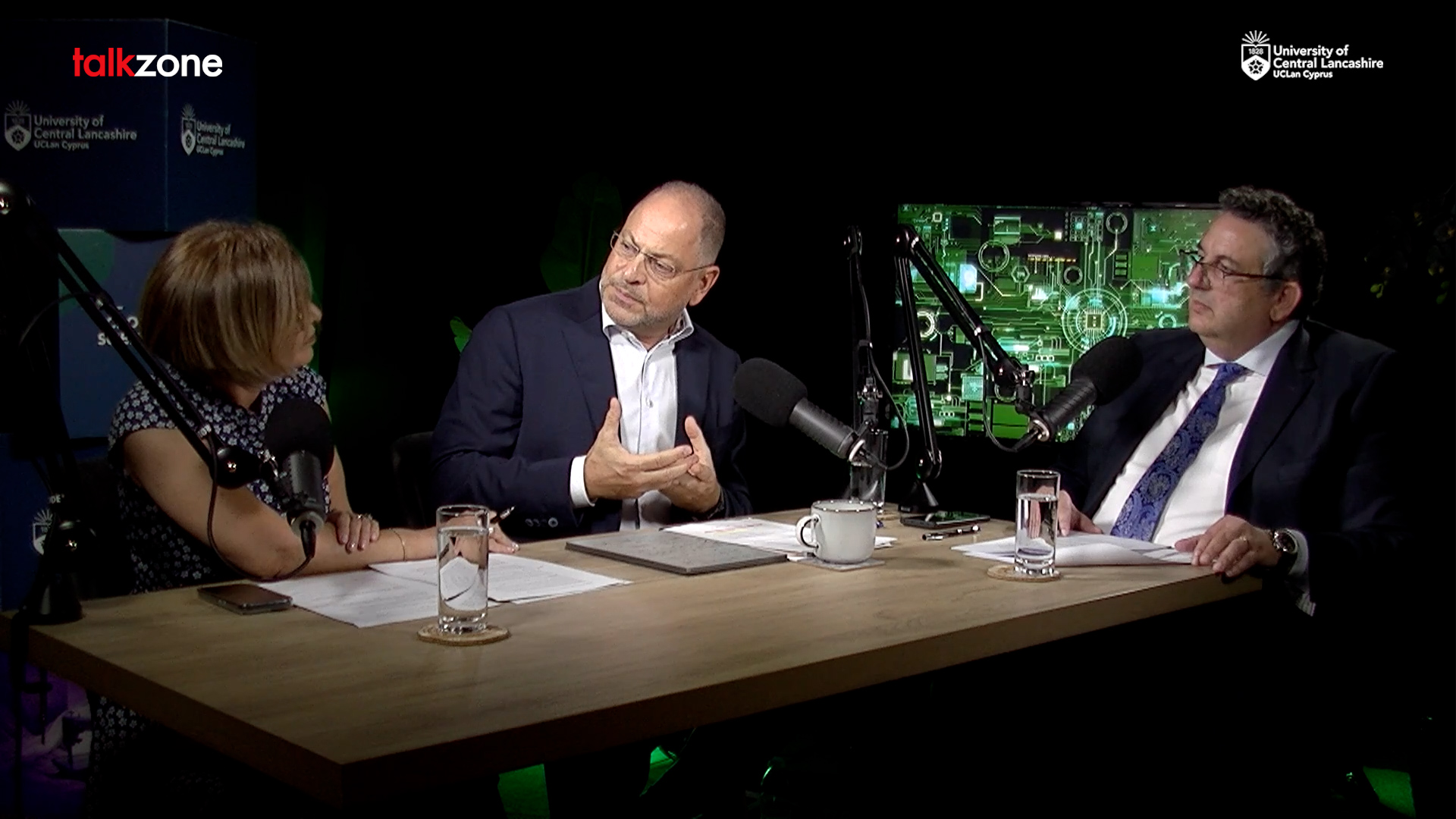The Chief Scientist, Demetris Skourides has launched a new podcast series aimed at putting people, purpose and innovation at the heart of the artificial intelligence (AI) debate.
Fearless Future, produced at UCLan Cyprus’ media studio and streamed live on LinkedIn, is the first podcast of its kind in Cyprus to be designed for individuals, citizens and organisations around the world.
The first episode, The Future of Work in the Age of AI, brought together Skourides and Philippos Soseilos, CEO and chairman of PwC Cyprus, in a discussion moderated by HR transformation specialist Nicoletta Papakyprianou.
The conversation focused on how AI is reshaping the global workforce and drew on PwC’s 2025 Global AI Jobs Barometer, McKinsey’s Superagency in the Workplace, IDC’s FutureScape GenAI Predictions, and the World Economic Forum’s Future of Jobs Report 2025.
Skourides said they were no longer asking if AI would transform the world but rather how, where and to what end.
He added that the mission of Fearless Future was to shift the dialogue away from fear and towards human-first, AI-enabled transformation.
“This podcast is an open invitation, not just to governments and businesses, but to every individual, to be part of this moment,” he said.
All four reports, he explained, point to the same trend, that AI is accelerating productivity, unlocking human potential and redefining value creation across industries.
However, the future will not happen automatically and requires vision, trust, leadership and a shift in mindset.
He also spoke about the lifelong learning initiatives being developed by the National AI Taskforce, highlighting the importance of embracing continuous learning.
“AI is not replacing opportunity, it’s redefining and expanding it,” he said, noting that the real challenge is not in eliminating tasks but in redesigning jobs.
Letting machines take on administrative burdens, he added, allows humans to focus on quality, insight and innovation.
He also pointed out that over 90 per cent of the data in use today was generated after COVID-19, showing the unprecedented speed of digital acceleration.
The only way forward, he said, is to leverage AI intelligently to navigate that complexity.
Soseilos described this as the beginning of a new era, acknowledging that while there is hesitation, there is also tremendous potential.
He called this a moment for “no-regret moves”, staying informed, raising awareness and starting to experiment, and warned that doing nothing is the greater risk.
He observed that many employees are already using AI tools such as ChatGPT to accelerate their work but are afraid to admit it.
Organisations, he said, must create safe spaces for experimentation. If people simply do the same job faster, they are not moving up the value chain. “This is about transforming roles, not just enhancing speed,” he said.
Soseilos also pointed to a significant economic shift, saying that by 2026, AI and automation are expected to drive one trillion dollars in development gains. By 2030, up to 30 per cent of the global workforce could be impacted.
This, he stressed, is why organisations need to rethink roles and adapt before the gap widens.
Skourides agreed and spoke about the need for trust and culture change. Just as the world once became cloud-first, he said, maybe now it should become AI-first.
This means building a safe culture where people can experiment without fear, where using AI to save time and improve outcomes is celebrated rather than hidden.
AI, he noted, has the potential to support better work–life balance.
Turning to Cyprus’ own AI strategy, Skourides outlined the work of the National AI Task Force, which he has chaired since January 2025. The group brings together academia, industry and government to shape priorities in research, industry applications and digital upskilling.
“Cyprus is 86 per cent reliant on services. It’s a strong service-oriented economy. We are pivoting to a knowledge economy, and that requires careful planning, especially around infrastructure, workforce development, and collaboration with fast-moving startups,” he said.
He also highlighted the leadership role of the Deputy Ministry of Research, Innovation and Digital, working with the human resource development authority (Anad) to boost digital skills.
The Anad, he said, has already delivered more than 15 training programmes and workshops available to the public.
A key initiative, AI for Government, is led by the deputy ministry and co-designed with the Research and Innovation Foundation (RIF). It allows innovation companies to solve real ministerial challenges, turning the state into a living laboratory for applied AI.
“Now is the time to build a clear and proactive AI strategy,” Skourides said.
“AI is not and should not just be another tactic. It’s a fundamental shift in how we experience intelligence. The question for every organisation is where does AI create value, where does it introduce risk, and what must we do to capture value and manage that risk.”
He called on companies to pair technology adoption with investment in people, encouraging lifelong learning so individuals can grow alongside AI.
“This moment calls for curiosity, adaptability, and personal responsibility. The future belongs to those willing to learn, unlearn, and lead forward,” he said.
Soseilos added that bold ambition must be matched with trust, which comes from clear governance and responsible AI deployment at both the state and organisational level. Only then, he said, can shared prosperity be unlocked.
He also warned that the more capable AI becomes, the more data it will require.
“We’re not heading into a future where data stabilises, we’re heading into one where the demand for data accelerates. Organisations need to be ready for that scale,” he said.
Moderator Papakyprianou said Fearless Future was designed to be accessible to everyone, not just technologists or policymakers. If someone is navigating change, leading a team or thinking about their future career, she said, this podcast is for them.
In closing, Skourides emphasised the work being done by the Deputy Ministry to modernise the foundations for AI adoption.
He stressed that now is the time for organisations and individuals to take a more active role in shaping the future.
“We’re at a turning point, not just in technology, but in how we think about work, learning, and leadership. AI gives us the chance to be more creative, more human, and more impactful. But that future depends on us. It depends on leaders who are willing to invest in people, and individuals who are ready to grow,” he said.
When asked about job displacement, Skourides provided a list of 20 roles he expects to grow in the coming years, stressing that it was not exhaustive.
He urged companies to go beyond discussion and start implementing practical, people-focused AI strategies. “This podcast isn’t just a platform, it’s a starting point. A place for ideas, dialogue, and action. If you want to understand how AI is really changing the world of work, this episode is where you begin,” he said.
He added by calling this a moment to reflect, to strategise and to lead with purpose. “AI has the potential to democratise knowledge, shift business models, and transform how people experience intelligent insights. Let’s build a development roadmap that empowers people first and creates real value.”
Skourides concluded by saying that Fearless Future will continue, with upcoming conversations in Japan, the UAE and India this September exploring how AI intersects with skills, innovation and national strategy.






Click here to change your cookie preferences